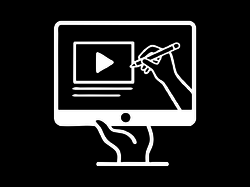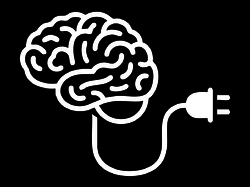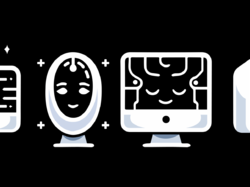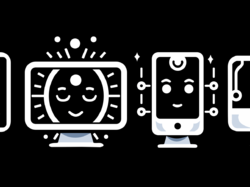
Don’t look now, but your word processor is distracting you.
It’s tempting you with font choices, text alignments, bullet styles and page-layout options. It interrupts you with obvious suggestions for how to write a list or introduce a letter.
Alas, none of that actually has anything to do with the words and ideas that you’re trying to express. The best ideas require concentration and little more.
When author Jonathan Franzen wrote The Corrections, he went so far as to blindfold himself in order to give complete concentration to his prose. In a 2001 profile of Franzen, The Guardian wrote:
He locked himself away in his spartan studio on 125th Street in East Harlem to write. Some days, in order to keep his mind “free of all clichés,” he wrote in the dark, with the blinds drawn and the lights off. And he wore earplugs, earmuffs and a blindfold. “You can always find the ‘home’ keys on your computer,” he says in an embarrassed whisper. “They have little raised bumps.”
Here’s a guy who won the National Book Award for his novel, and he couldn’t even see his screen, let alone diddle with his word processor’s line spacing. “What you see is what you get?” When your task is building ideas, WYSIWYG just isn’t all that relevant.
Point is, there are times to focus on words and there are times to focus on presentation; they’re hardly ever the same moment.
Before you rush out to the blindfold store or build your own Franzen-esque sensory-deprivation cell, I have a more modest proposal. Stop using Microsoft Word to do your writing.
The Good Easy
Seven years ago, Mark Hurst and his colleague Zimran Ahmed showed me Mark’s personal tech setup for promoting productivity and creativity. Mark is the founder of Creative Good and the soft-spoken advocate of “bit literacy” (the management of information overload and also the title of his forthcoming book).
Mark dubbed his fin-de-siècle Mac OS9 setup “The Good Easy.” At its core was a reliance on a lean collection of apps (text editor, e-mail, calendar) that all used plain text. No fancy presentation or elaborate file formats, no tech overkill.[1]
Spurning WYSIWYG authoring and proprietary file formats, Mark’s system put the focus squarely on the text itself: bare ideas revealed.
I was hooked. I retired Microsoft Word, and I’ve been living and breathing in a plain-text editor ever since. And friends, the air in this plain-text world is sweet and clear, unpolluted by unnecessary distractions.
Marvelous Markdown
Not all formatting is superfluous, of course. Good formatting enhances meaning and gives your ideas structure and emphasis. That’s the sublime genius of John Gruber’s Markdown syntax, an intuitive format for structuring text and giving words and passages appropriate emphasis.[2]
Everything I write is written in the Markdown format. I use it in all of my e-mails. I use it in my support forums. I use it in hand-written notes. And of course I’m using it at this very moment, since Big Medium automatically converts Markdown into HTML. (Heck, you can even give it a try yourself, by typing a comment in Markdown in the comment field below.)
If you’re not familiar with Markdown, here’s the dish. It doesn’t look like much, and that’s the idea. Markdown uses the familiar conventions of the typewriter age to convey formatting:
You can _underline_ text or make it **bold**.
One of my favorites: I can add [links with footnote-style URLs][1].
The links are added automatically when my text is converted to HTML.
* To make a list...
* just use asterisks...
* as bullets.
To quote someone, use the familiar e-mail convention:
> Four score and seven years ago our fathers brought forth
> on this continent a new nation, conceived in Liberty, and
> dedicated to the proposition that all men are created
> equal.
[1]: http://www.example.com/
Kids, I’m crazy for Markdown. Sure, sure, it’s practical and useful, but more than that, it promotes a kind of healthy mental hygiene. As I format my plain-text words and nudge my prose into its proper structure, I find that I express my ideas more clearly.
The subtle influence of formatting style on creativity and mental clarity might help explain why the typical programmer is so adamant about using a specific coding style. Whole religious wars are fought over whether to use tabs or spaces. Those little whitespace niceties, seemingly inconsequential to those outside the field, define an individual coder’s distraction-free comfort zone. Seeing code formatted in a different style feels like someone’s rubbing your eyes with sandpaper.
Start using Markdown regularly, and I think you’ll start feeling the same way about the layout of your prose.
Dilemma of a CMS Author
So what gives with Big Medium’s WYSIWYG editing features? If I’m such an advocate of plain-text composition, why provide a WYSIWYG editor as my software’s default method for text input?
To be honest, I wish that I didn’t have to. I never use it myself. No surprise, I prefer to enter all of the text for this site in Markdown. But I’m realistic. I know that the WYSIWYG option is the preferred and comfortable interface for most people. My customers demand it.
But that “Markdown” tab is lurking right next door to the WYSIWYG editor, and I’m hopeful that at least a few Big Medium users will discover the advantages of editing their words in plain text.
Why not give it a try? Kick Microsoft Word to the curb for a week. Open up Notepad or Textmate or BBEdit or TextWrangler or EditPlus instead. No blindfold required.
1. Zimran later wrote a column for Wired that explained how the Good Easy's retro methods shared philosophical similarities with the Unix system and culture: “With a bit of effort it's possible to hack your computer into something resembling a Sixties-era Unix box. Do it, and it'll return some productivity to your life.” Back
2. As I write this, Markdown creator John Gruber is in the midst of a fund-drive for his reader-supported site Daring Fireball. If you appreciate Markdown or Daring Fireball as I do, please consider making a contribution. Back





